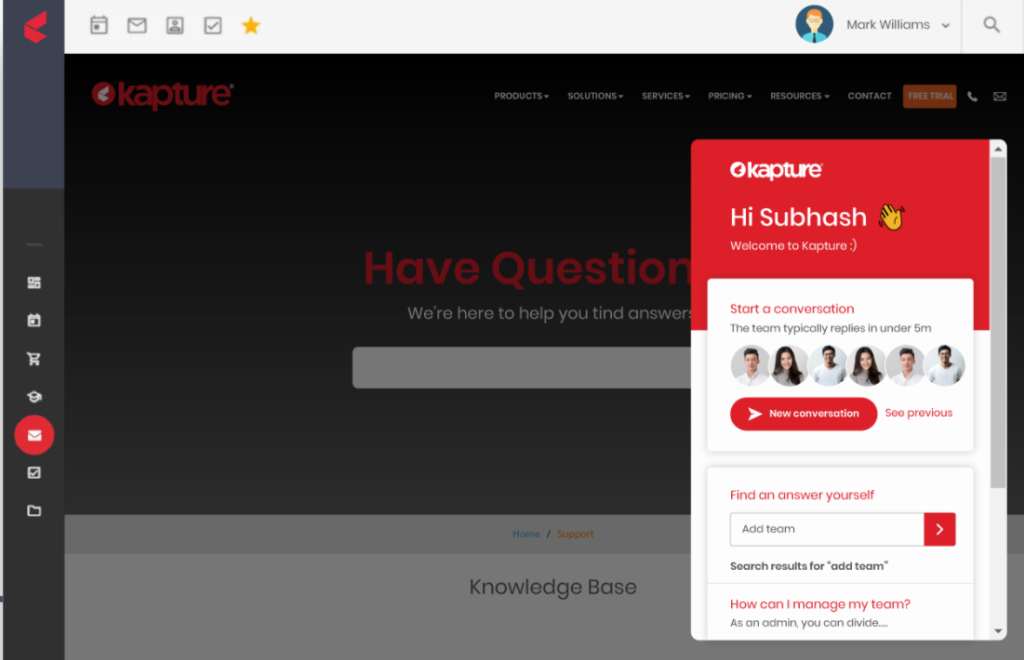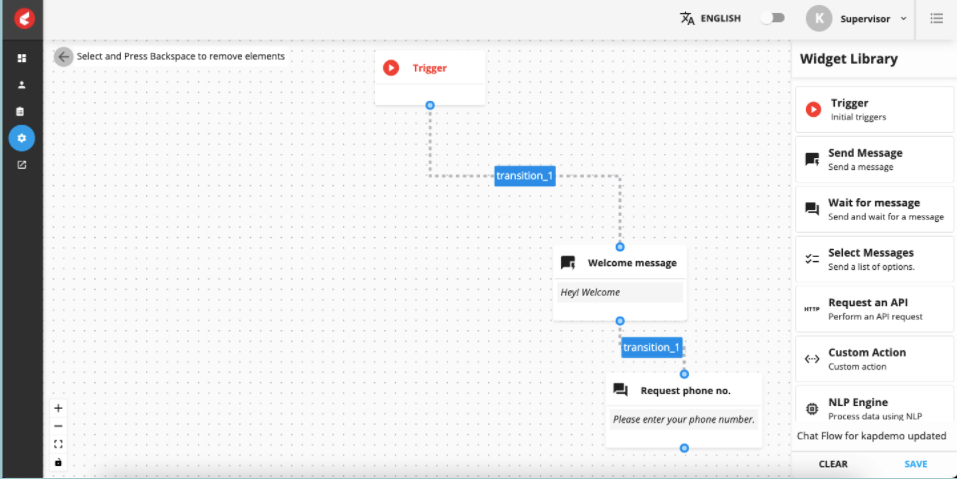The major challenges faced by customers when they reach out to a customer service center are slow response time and the transfer of calls from one agent to another. Describing the same issue to agents across different departments is a time killer. Therefore, customer self-service backed by a Knowledge base is important in tackling this situation.
A self-service Knowledge base is a repository of information that is the foundation of your Knowledge Management System. You can think of a knowledge base as an online library loaded with guides, tutorials, FAQs, and manuals that serve employees and customers alike.
Quick Access:
- Importance Of Knowledge Management In Customer Self-Service
- Benefits of knowledge management in Self-service
- Best Practices For Your Knowledge Base
- How to measure self-service performance?
- How can the knowledge management approach transform a better customer service experience?
Importance Of Knowledge Management In Customer Self-Service
As self-service options open the gateway of interaction with your brand, it is necessary to know the importance of Knowledge Management. Here’s why knowledge management is so important in customer self-service,
Customers demand it
As per reports,
- 51% of customers prefer support through an online knowledge base. –Econsultancy
- 70% of customers prefer to use a company’s website to get answers to their questions rather than use phone or email.- Forrester
- 70% of customers said they expect a company website to include self-service options. –Superoffice
It’s just that customers love self-service because of the convenience it offers.
Faster query resolution
Automated customer service tools with Knowledge Management make it possible to resolve issues such as password reset, login troubles, and basic service queries without help from your service staff. Thus improving the First Call Resolution rate and Average Handling Time.

Image: Kapture’s self-help
Improves productive employee time
- Intelligent Chatbots equipped with human skillsets guide customers on routine how-to-tasks.
- When customers are empowered to self-serve, ticket volumes related to repetitive queries get reduced. Hence, employees can focus on complex service queries.
Facilitates assistance at all stages of the customer journey
- Knowledge Management makes it a reality to offer frictionless self-service possible to customers at all stages of the customer journey.
- This includes the very first touchpoint when customers browse your website to make a purchase, the follow-up stages like pre and post-onboarding, and extend to post-purchase services.
Ease of Access of information
- Search bars on customer self-serve portals can fetch the queried information from the knowledge base.
- Newsflashes about the latest offers, the extended warranty period for specific products, changes in company policies, or other latest business news on your website help employees and customers to be on the same page. Also, customize the newsflashes based on location or time.
- Design FAQ pages and place them on your website where your customers can locate them with ease. It can be linked to a self-serve portal or accessed through chatbots.
Take a look at McDonald’s friendly and sociable FAQ page,

Source: McDonald’s
Offers intelligent solutions to customer queries
- When employees or service staff are in a tight spot scanning and resolving lofty volumes of tickets, Virtual Assistants like Kapture’s Agent Assistant can guide employees by offering contextual support.
- For example, Virtual Assistant can identify information like customer priority level, product warranty period, customer profile, past purchases, customer preferences, and a whole lot more. It presents your staff with the right suggestion to handle a customer query contextually using insights gained from this information.
- It can also suggest relevant help topics from the Knowledge base. The Virtual Assistant can be enabled in the ticket log page of your Customer Service tool.
Improves standard KPIs
Businesses can track the queries asked by customers, commonly discussed issues, or frequently visited help topics. This helps to
- identify common pain areas that need attention or a fix.
- understand how customers are engaging with your product.
- identify the user-friendliness of your product.
Now, strategize improvement areas pertaining to all aspects of your business. Working on the weak areas naturally improves customer satisfaction thereby generating better KPIs like NPS, CSAT, and CES.
“45% of organizations that offer web or mobile self-service options noticed an increase in website traffic and a reduction in phone inquiries.” –CRM Magazine
Ensures consistent help
- When well-formulated information is available, customers can seek consistent information. There is no probability of the information being less accurate since everybody in the organization refers to the same standard information through the Knowledge Management Systems.
- This eliminates the chances of receiving incomplete information by a stressed-out service provider who is in the middle of a sophisticated query resolution process.
Seek information as per need or convenience
- Customers can look at quick tips or read detailed answers to queries if they prefer to. Knowledge Management Software makes it possible to access information according to customers’ time and convenience.
- Having access to the Knowledge base through chatbots or self-serve portals, customers can seek information round the clock.
Offer personalized experience
Intelligent chatbots track purchase history and browsing behaviors to provide customers with personalized suggestions and product recommendations.
Analytic engines can recommend the most searched queries or present help articles based on customers’ online behavior.
Knowledge Management is again important for customer self-service because it offers the following benefits.
Benefits of knowledge management in Self-service
Customers can choose a mode of information they favor
Customers can choose the preferred mode of learning that suits their level of understanding. Make knowledge base available in the form of
- FAQs
- PDF guides
- Video tutorials
- Case Studies
- Webinars
Helps set up training quickly
Knowledge Management Systems can be used to provide faster training to customers at the time of onboarding as organized and structured information is readily available.
Customers can help themselves to basic product training manuals, videos, set-up guides too.
Helps stay ahead in the competition
Knowledge Management System gives your organization a competitive edge as customers are better served when information is easily accessible.
What follows is more engagement with your brand, improved loyalty, and reduced churn.
Helps launch a central knowledge repository
As an added value, Knowledge Management is a means to collectively systemize all the information that’s scattered across your organization in emails, PDFs, videos, and everywhere else.
The retiring senior executives or product experts can contribute to the knowledge repository. This ensures every bit of information is utilized to help the organization.
Best Practices For Your Knowledge Base
Keep it simple and easy to navigate
Group similar topics for ease of navigation and provide search bars to easily locate the information. Frame answers in a simple, and straightforward manner so that the answers do not prompt further questions. Also, provide complete answers to address gaps that may occur whatsoever.
Easy to locate
The knowledge base interface must be placed such that the customers can spot it without a hitch. Link knowledge base to the self-serve portal, chatbot, or help section of the website.
Make the knowledge content comprehensible
Provide a worthwhile experience when customers go through the self-help knowledge base. Make it attractive and comprehensible using images, graphics, flow diagrams, or animations. With appealing and graspable content, customers may seek more information than they actually need to and thus engage more with your business.
Address the gaps
Track the frequently searched chatbot topics, tickets pertaining to common issues, email or message queries, and most-discussed issues in social media. Address these issues by providing solutions through the Knowledge base.
Better yet, what about automatically linking a common query to the solution from the Knowledge base?
Keep it latest
Update your knowledge base frequently so that your customers can seize reliable and accurate information. Customers can easily make out fresh content from an obsolete one. So, schedule timed updates for your knowledge base so that you update the content on a regular basis.
That way you will never miss out on adding information about a new product or policy.
Get feedback
Collect feedback from customers after they availed themselves of a self-help service. Ask them about the effectiveness of the self-help feature and its completeness in addressing the query. Improve your knowledge base content in alignment with the feedback.
Get the right tools
Customer service automation tool, with an efficient Knowledge Management System that offers the following features, is the right choice of software to host and manage your knowledge base.
- Easy to use and implement
- Cross-platform or device accessibility
- Reporting and Analytics to manage knowledge base updates
- Customization capability to offer a personalized experience

Image: Kapture’s customizable chatbot workflow
How to measure self-service performance?
It is important to measure self-service performance because it is critical to improving customer experience. Here are a few metrics that help you measure self-service performance.
Deflection Rate
Case deflection rate is the rate at which customers are able to find answers without requiring additional help. Tracking the number of search queries with a click on the results in your self-serve interface which did not end up in a ticket log or additional support from staff gives you the deflection rate. A low deflection rate signals poor self-service performance.
Recontact Rate
From frequent page visits by customers for a specific topic, you can infer the quality of content to be confusing or difficult to comprehend.
Conversion Ratio
Check how many new prospects visiting your self-service features turn into potential customers. This indicates the resourcefulness of your knowledge base and self-service features.
Abandon Rate
Check how soon the customers abandon your self-service feature. This could mean incomplete or outdated content.
How can the knowledge management approach transform a better customer service experience?
“56% of people around the world have stopped doing business with a company because of a poor customer service experience.” – Microsoft
- Customer self-service is a faster and more cost-effective way to create a better customer experience. This is because in the self-service approach we empower the customers to find solutions to their problems themselves.
- Delivering self-service means providing the customers with a resourceful software solution with Knowledge Management to access self-help information that makes self-service possible anytime and anywhere.
- A perfect Knowledge Management System augments the self-service and thereby elevates the customer service experience. Go for a solution that is effective, fast, affordable, and at the same time scalable to suit your growing business needs.
- Knowledge is the most valuable asset of any organization. Manage it wisely with Knowledge Management System to improve customer experience.
“70% of customers now expect a company’s website to include a self-service application.” – source
- Moreover, when customers demand solutions instantaneously, give them the benefit of a self-service Knowledge Management System. Explore more with a free demo of Kapture!
About the Author | |
 | Seema C Mohan |
| Seema C Mohan is a content writer at Kapture. She is passionate about all things XaaS and loves to write value-added content. She has been in Business Process Management in the past and has experience in streamlining processes for Enterprise Mapping Projects. She has published technology articles in National and International journals. Her job at Kapture helps her gain more insight into the SaaS industry and emerging technologies. | |
,
,
,
,
,
,
,
,
,
,
,
,
,







